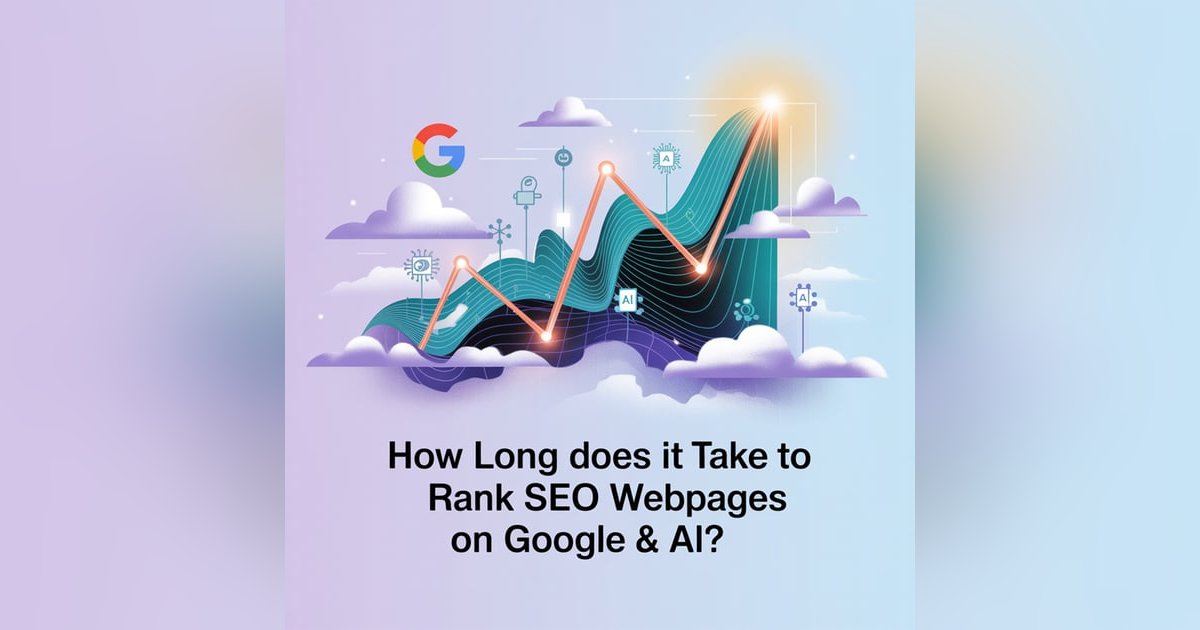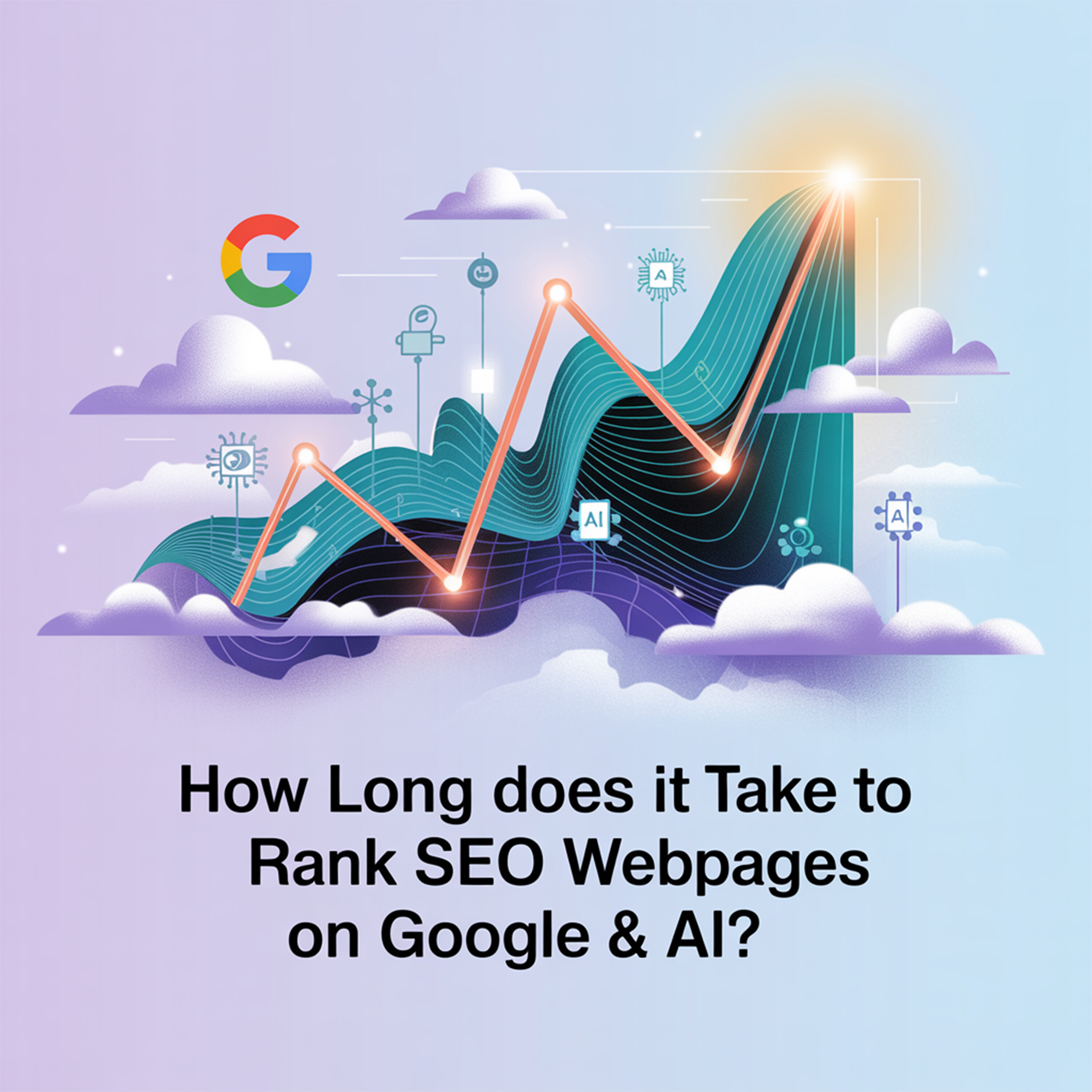How Long Does It Take to Rank SEO Webpages on Google & AI Search Engines? (SEO Masterclass with Favour Obasi-ike)


How Long Does It Take to Rank SEO Webpages on Google & AI? with SEO Expert, Favour Obasi-ike, MBA, MS
The We Don't PLAY podcast host discusses how long it takes for SEO web pages to rank on Google and AI search engines, emphasizing that there's no single answer, ranging from days to months or even years depending on website history and consistent updates.
I highlight the importance of submitting websites to Google Search Console, understanding domain and hosting, and strategically creating content that answers questions. They differentiate between Google's organic impressions and AI's "earned SEO"or earned impressions, underscoring that being visible on Google is a prerequisite for AI search visibility.
The discussion also touches on content velocity, the value of a consistent online presence, and how to use tools and strategies to improve search engine optimization for both traditional and AI-driven searches.
FAQs about this episode
1. How long does it typically take for a new webpage to rank on Google and AI search engines?
For a brand new website or webpage, it generally takes around 3 to 6 months to start ranking significantly on Google and AI search engines. For an existing website or webpage, it can take days to weeks to significantly show up on Google and AI search engines. However, the speaker highlights a case where an article ranked in just two days. This rapid ranking is attributed to the website's existing credibility, similar to having a good credit score with a bank. Google and AI prioritize established entities. For entirely new content, especially if it's the first time a link has surfaced on the internet, it can even rank within 24 hours. The key takeaway is that it's a marathon, not a sprint, and consistent effort is crucial for long-term gains.
2. What are the foundational steps to ensure a website can even appear on Google and AI search results?
Before any SEO efforts can be effective, your website needs to be visible to search engines. The first crucial step is to have a website that Google can "see." This involves submitting your website to Google Search Console, which acts as Google's internet service provider for your site. Without this submission, your website isn't connected to Google's internet, making it invisible to their indexing systems. Think of it like a book not being in a library's inventory; it can't be found. Additionally, your website needs proper hosting (e.g., WordPress, Hostinger, GoDaddy), as a domain alone isn't enough to make it a functional, searchable website.
3. How do traditional SEO and AI search results differ, and what does "earned SEO" mean in this context?
The speaker distinguishes between traditional SEO and AI searches by introducing the concept of "earned SEO." Traditional SEO focuses on organic impressions, where your content naturally ranks based on relevance and quality. AI searches, on the other hand, are described as "earned impressions." This means that AI platforms like ChatGPT, Perplexity, and Grok look for the top results already showing up on Google. Therefore, if your website isn't ranking organically on Google in the first place, it's impossible for it to show up in AI search results. "Earned SEO" suggests that your presence and visibility on AI platforms are a consequence of having already "earned" strong organic rankings on traditional search engines. AI searches also have a shorter, often 24-hour, countdown timer for relevance, emphasizing rapid content updates and a broad presence across different platforms.
4. Why is consistent content updating and strategy crucial for long-term SEO success?
SEO is not a one-time fix; it requires continuous effort. Google (and now AI) periodically "deletes" or de-prioritizes old, irrelevant content from its servers if it's not updated. The concept of "tokenization" refers to the duplicate copy of your webpage that Google remembers, and if this isn't refreshed, your content will lose visibility. Therefore, consistently updating existing articles (even minor edits) and publishing new content with a clear strategy and plan are vital. This continuous effort creates a "spiderweb" of interconnected content, signaling to search engines that your website is active, relevant, and authoritative.
5. What role does "content velocity" play in effective marketing and SEO?
Content velocity refers to how quickly you can create and distribute relevant content across various platforms. Beyond just quality (answering questions and providing value), the speed at which you produce and share content significantly impacts your reach and ranking potential. Distributing content on platforms like Facebook, Pinterest, Clubhouse, LinkedIn, and various podcast directories (Apple Podcast, Spotify, Amazon Music) creates numerous backlinks and brand mentions. This widespread presence, coupled with consistent new content, signals authority and relevance to search engines, leading to increased visibility and better ranking opportunities over time.
6. How can businesses leverage diverse online platforms to enhance their search engine visibility?
Businesses should aim for a multi-platform strategy to maximize their visibility. This includes having a robust website, a consistent podcast presence across various directories (Apple, Spotify, Amazon), an active social media presence (Facebook, LinkedIn, Pinterest, TikTok), and engaging email marketing. Each of these platforms, when properly optimized with relevant content and clear calls to action (like linking back to your website), contributes to a stronger online footprint. For example, a podcast episode appearing on 10 different directories means 10 backlinks to your website, significantly boosting its authority and discoverability. The more widely your brand is mentioned and linked, the more search engines trust and prioritize your content.
7. What are "commercial blogs" and why are they becoming increasingly important in the age of AI-powered search?
Commercial blogs are informational content designed to answer specific user queries that have a commercial intent, even if indirectly. The speaker emphasizes that while general informational questions like "What time is it?" are common, the trend is moving towards more specific queries, often posed to AI assistants or search engines, that imply a need for a product or service ("What are the best shoes to get in this store?"). If your business isn't creating content that directly or indirectly answers these commercially oriented questions, you risk being "off the radar." The goal is to create content that not only provides value but also subtly guides users towards your offerings, making your website a source for solutions that lead to conversions.
8. What does "your voice is your invoice" mean in the context of online presence and business growth?
"Your voice is your invoice" encapsulates the idea that actively putting out your expertise and value in the online sphere directly leads to financial reward. This "voice" isn't just speaking aloud; it includes all forms of content creation: social media posts, website content, emails, and participation in online discussions (like speaking on Clubhouse stages). By consistently providing value and answering questions through your content, you gain recognition, establish authority, and attract your ideal audience. The more you "speak up" and share your knowledge, the more you get "paid" in terms of leads, clients, and revenue. It also serves to repel those who are not a good fit, allowing you to focus your efforts on genuine opportunities.
Digital Marketing Resources:
>> SEO Optimization Blogs
Brands We Love and Support
Loving Me Beauty | Buy Vegan-based Luxury Products
Unlock your future in real estate—get certified in Ghana today!
See Privacy Policy at https://art19.com/privacy and California Privacy Notice at https://art19.com/privacy#do-not-sell-my-info.


